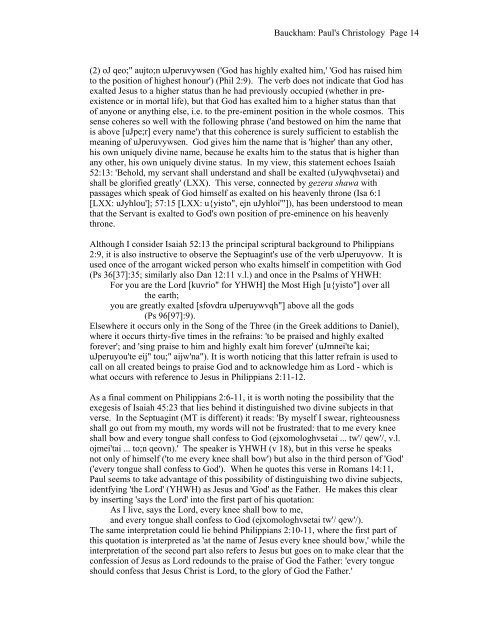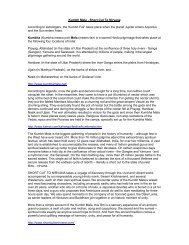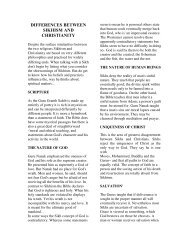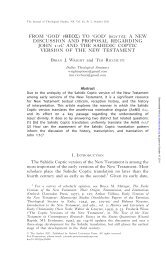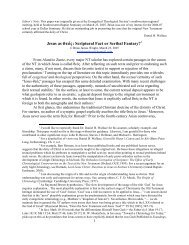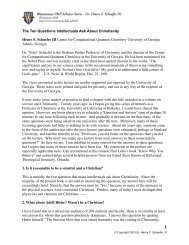Paul's Christology of Divine Identity © Richard ... - For an Answer
Paul's Christology of Divine Identity © Richard ... - For an Answer
Paul's Christology of Divine Identity © Richard ... - For an Answer
You also want an ePaper? Increase the reach of your titles
YUMPU automatically turns print PDFs into web optimized ePapers that Google loves.
Bauckham: <strong>Paul's</strong> <strong>Christology</strong> Page 14<br />
(2) oJ qeo;" aujto;n uJperuvywsen ('God has highly exalted him,' 'God has raised him<br />
to the position <strong>of</strong> highest honour') (Phil 2:9). The verb does not indicate that God has<br />
exalted Jesus to a higher status th<strong>an</strong> he had previously occupied (whether in preexistence<br />
or in mortal life), but that God has exalted him to a higher status th<strong>an</strong> that<br />
<strong>of</strong> <strong>an</strong>yone or <strong>an</strong>ything else, i.e. to the pre-eminent position in the whole cosmos. This<br />
sense coheres so well with the following phrase ('<strong>an</strong>d bestowed on him the name that<br />
is above [uJpe;r] every name') that this coherence is surely sufficient to establish the<br />
me<strong>an</strong>ing <strong>of</strong> uJperuvywsen. God gives him the name that is 'higher' th<strong>an</strong> <strong>an</strong>y other,<br />
his own uniquely divine name, because he exalts him to the status that is higher th<strong>an</strong><br />
<strong>an</strong>y other, his own uniquely divine status. In my view, this statement echoes Isaiah<br />
52:13: 'Behold, my serv<strong>an</strong>t shall underst<strong>an</strong>d <strong>an</strong>d shall be exalted (uJywqhvsetai) <strong>an</strong>d<br />
shall be glorified greatly' (LXX). This verse, connected by gezera shawa with<br />
passages which speak <strong>of</strong> God himself as exalted on his heavenly throne (Isa 6:1<br />
[LXX: uJyhlou']; 57:15 [LXX: u{yisto", ejn uJyhloi'"]), has been understood to me<strong>an</strong><br />
that the Serv<strong>an</strong>t is exalted to God's own position <strong>of</strong> pre-eminence on his heavenly<br />
throne.<br />
Although I consider Isaiah 52:13 the principal scriptural background to Philippi<strong>an</strong>s<br />
2:9, it is also instructive to observe the Septuagint's use <strong>of</strong> the verb uJperuyovw. It is<br />
used once <strong>of</strong> the arrog<strong>an</strong>t wicked person who exalts himself in competition with God<br />
(Ps 36[37]:35; similarly also D<strong>an</strong> 12:11 v.l.) <strong>an</strong>d once in the Psalms <strong>of</strong> YHWH:<br />
<strong>For</strong> you are the Lord [kuvrio" for YHWH] the Most High [u{yisto"] over all<br />
the earth;<br />
you are greatly exalted [sfovdra uJperuywvqh"] above all the gods<br />
(Ps 96[97]:9).<br />
Elsewhere it occurs only in the Song <strong>of</strong> the Three (in the Greek additions to D<strong>an</strong>iel),<br />
where it occurs thirty-five times in the refrains: 'to be praised <strong>an</strong>d highly exalted<br />
forever'; <strong>an</strong>d 'sing praise to him <strong>an</strong>d highly exalt him forever' (uJmnei'te kai;<br />
uJperuyou'te eij" tou;" aijw'na"). It is worth noticing that this latter refrain is used to<br />
call on all created beings to praise God <strong>an</strong>d to acknowledge him as Lord - which is<br />
what occurs with reference to Jesus in Philippi<strong>an</strong>s 2:11-12.<br />
As a final comment on Philippi<strong>an</strong>s 2:6-11, it is worth noting the possibility that the<br />
exegesis <strong>of</strong> Isaiah 45:23 that lies behind it distinguished two divine subjects in that<br />
verse. In the Septuagint (MT is different) it reads: 'By myself I swear, righteousness<br />
shall go out from my mouth, my words will not be frustrated: that to me every knee<br />
shall bow <strong>an</strong>d every tongue shall confess to God (ejxomologhvsetai ... tw'/ qew'/, v.l.<br />
ojmei'tai ... to;n qeovn).' The speaker is YHWH (v 18), but in this verse he speaks<br />
not only <strong>of</strong> himself ('to me every knee shall bow') but also in the third person <strong>of</strong> 'God'<br />
('every tongue shall confess to God'). When he quotes this verse in Rom<strong>an</strong>s 14:11,<br />
Paul seems to take adv<strong>an</strong>tage <strong>of</strong> this possibility <strong>of</strong> distinguishing two divine subjects,<br />
identfying 'the Lord' (YHWH) as Jesus <strong>an</strong>d 'God' as the Father. He makes this clear<br />
by inserting 'says the Lord' into the first part <strong>of</strong> his quotation:<br />
As I live, says the Lord, every knee shall bow to me,<br />
<strong>an</strong>d every tongue shall confess to God (ejxomologhvsetai tw'/ qew'/).<br />
The same interpretation could lie behind Philippi<strong>an</strong>s 2:10-11, where the first part <strong>of</strong><br />
this quotation is interpreted as 'at the name <strong>of</strong> Jesus every knee should bow,' while the<br />
interpretation <strong>of</strong> the second part also refers to Jesus but goes on to make clear that the<br />
confession <strong>of</strong> Jesus as Lord redounds to the praise <strong>of</strong> God the Father: 'every tongue<br />
should confess that Jesus Christ is Lord, to the glory <strong>of</strong> God the Father.'


